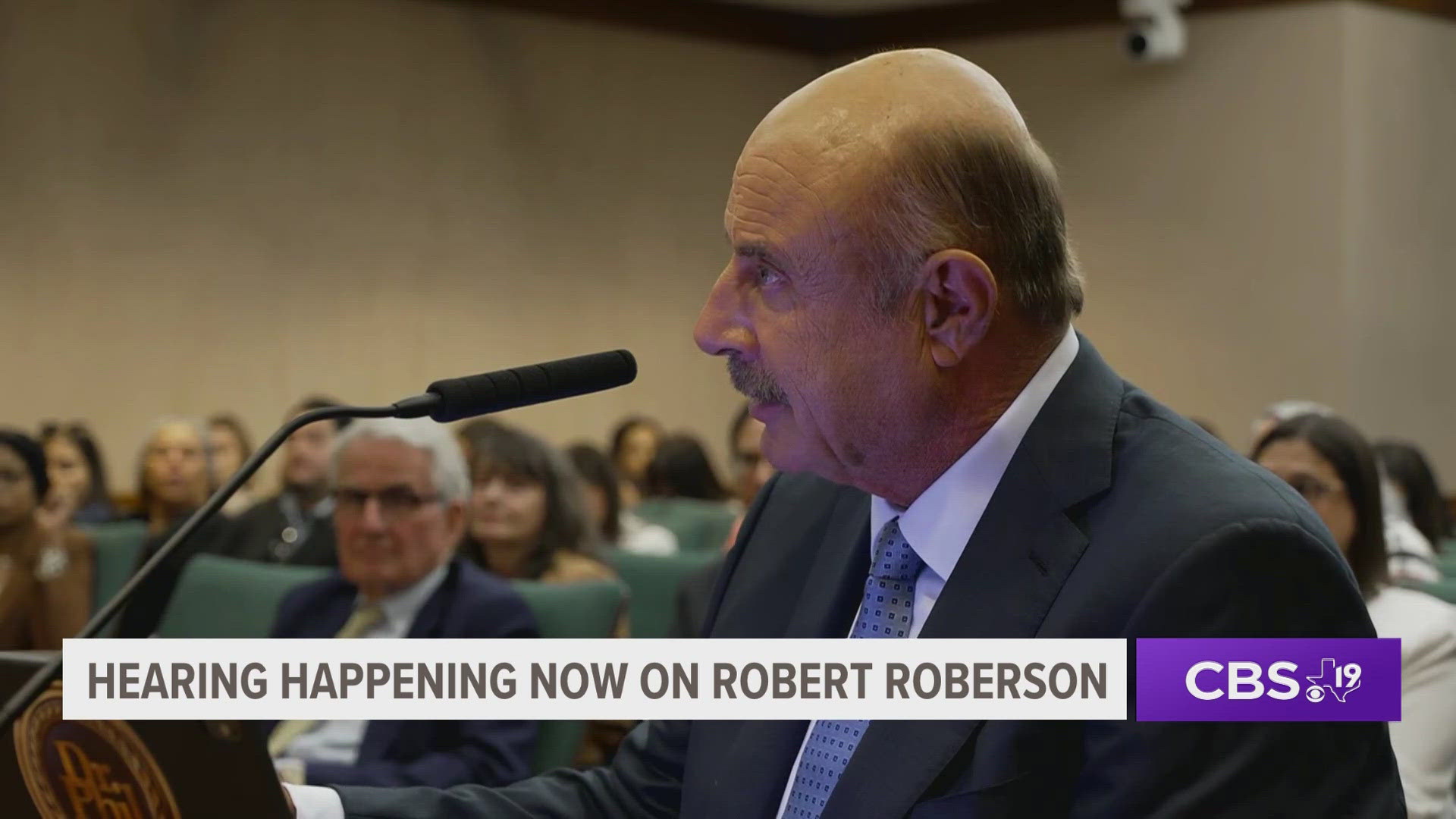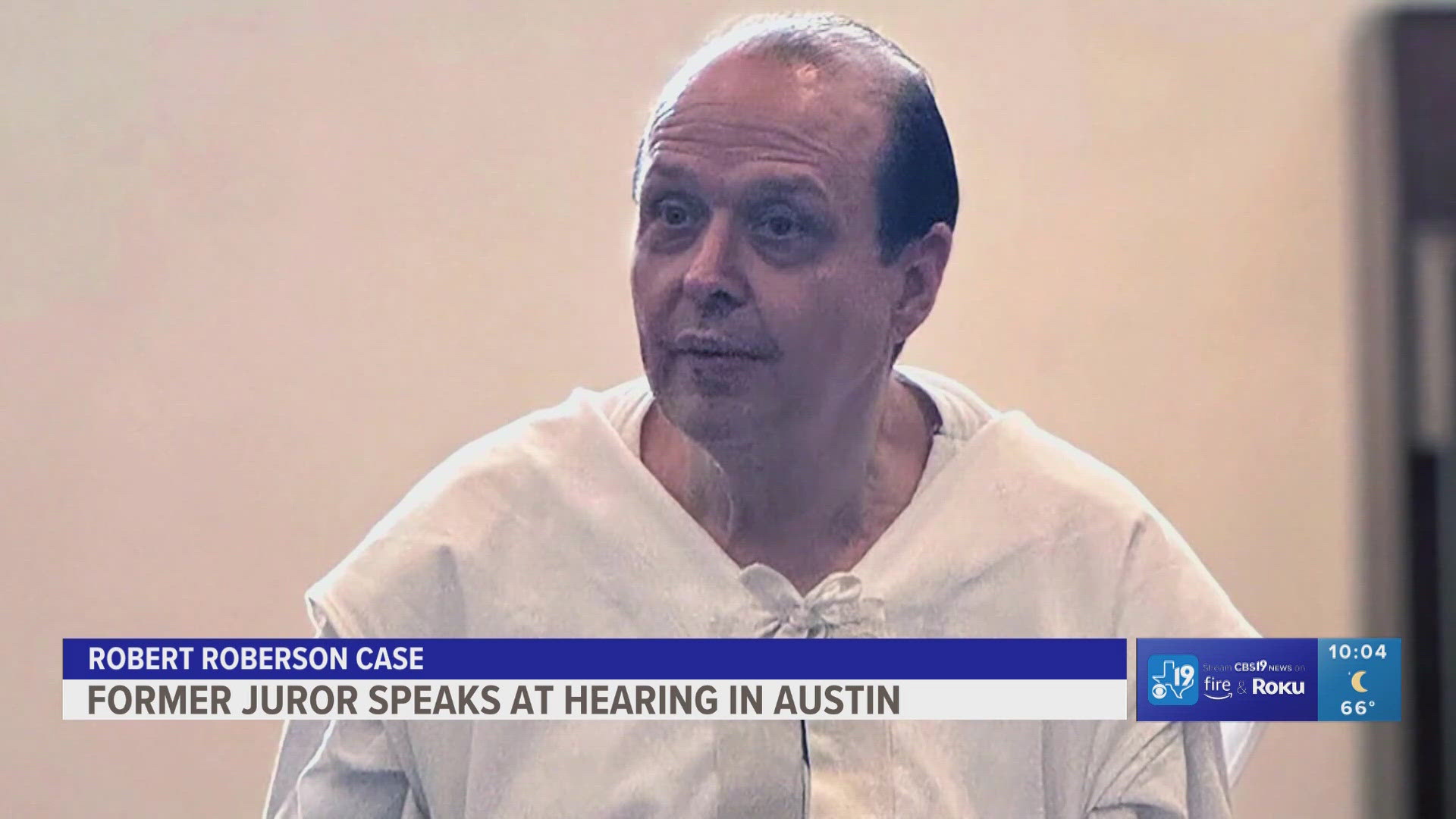Robert Roberson is seeking a new trial after being sentenced to death row following a murder conviction in 2003.
AUSTIN, Texas — The office of Attorney General Ken Paxton has responded to recent congressional hearings regarding East Texas death row inmate Robert Roberson III.
Roberson III, 57, was set to be executed Thursday, Oct. 17, in connection with the 2003 conviction in the death of his 2-year-old daughter Nikki Curtis. He has claimed his innocence for roughly two decades with his lawyer citing junk science as the reason for his conviction. According to the Associated Press, Roberson would have been the first person in the U.S. to be executed over a “Shaken Baby Syndrome” conviction.
Roberson’s execution was ultimately blocked by the Texas Supreme Court, sparing his life — for now.
A lengthy hearing was held earlier this week where, in addition to Roberson’s legal team, Dr. Phil McGraw and best-selling author John Grisham testified on his behalf.
Terre Compton, a former juror who initially voted to convict Roberson, also spoke to the committee saying she now believed, based off new evidence he is innocent.
“In good conscience, I could not live with myself thinking that I had a hand in putting an innocent man to death,” Compton said.
On Wednesday, Attorney General Paxton released a statement pushing back on the bipartisan group of legislators calling for a new trial for Roberson — just days after Gov. Greg Abbott also condemned their actions.
Attorney General Paxton’s statement can be read below:
The Office of the Attorney General released the original autopsy report and other evidence to correct falsehoods amplified by a coalition interfering with the capital punishment proceedings in which Robert Roberson was scheduled to be executed for the murder of his two-year-old daughter Nikki.
In 2002, two-year-old Nikki Curtis was brought to the hospital close to death with extensive bruising to her chin, face, ears, eyes, shoulder, and mouth. Emergency Room Nurse Andrea Sims, who saw Nikki before medical intervention, testified at trial that, in addition to the bruising, Nikki had a handprint on her face, and that the back of her skull was bruised and “mushy.” Robert Roberson, Nikki’s father, had a history of violently abusing his daughter, and witnesses testified in trial that they were afraid to leave Nikki alone with him because he would repeatedly “whip” her whenever the baby cried. Testimony showed that he often would strike Nikki “hard” with his hands, a board, or a paddle, and on at least one instance threw her off the bed. Robert Roberson’s own mother said at one time, “One of these days he’s going to kill her and it’s going to be too late for anyone to do anything about it.”
According to doctors testifying at the trial, Nikki died from substantial blunt force head injuries that clearly indicated the girl had been struck. The evidence of blunt force trauma precluded the possibility that the child died from being “shaken.” Nikki was abused by her father and died due to the trauma he inflicted. After hearing this evidence and countless hours of testimony about Roberson’s pattern of losing his temper and violently abusing his daughter, a jury of his peers convicted him of murder in 2003, sentencing Roberson to the death penalty for beating his own daughter so viciously that she died. The law in Texas is clear: the prosecution must prove their case beyond a reasonable doubt as to every element of the offense as it is charged in the indictment. Roberson was charged with capital murder for intentionally and knowingly causing the death of a child by causing blunt force head injuries.
Dr. Jill Urban, the medical examiner who performed the autopsy on the two-year-old’s corpse, testified during the trial using photographic evidence that Nikki’s head had been repeatedly struck leaving clear impact wounds totally incompatible with merely being violently shaken. Dr. Urban’s findings were reviewed by six supervising medical examiners at the Dallas County Medical Examiner’s Office, all of whom agreed and signed off on her autopsy report. In 2016, when Roberson’s case was being appealed, Dr. Urban unequivocally affirmed that she “quite clearly defined multiple impact sites to the head and ruled that the death was due to blunt force injuries.”
In addition to the medical evidence presented, Roberson repeatedly changed his story during the investigation and trial about what happened to Nikki, contradicting himself and demonstrably lying about the circumstances, his behavior, and the causes of his daughter’s condition. When Roberson brought the nearly lifeless Nikki to the hospital, he claimed to the nurses that she had merely fallen off the bed. Then he told different nurses that his daughter had hit her head on a table next to the bed. When questioned by the police, Roberson reverted back to the story that Nikki had simply fallen out of bed. Later, in his official statement to law enforcement, Roberson professed ignorance as to what caused the blunt force injuries to Nikki’s head and blamed his daughter for being clumsy and falling often.
Roberson also confessed to slapping his two-year-old daughter to “wake her up” before telling his girlfriend at the time, Teddie Cox, that Nikki had hit her head on “the brick” in the bedroom despite police noting that there was only carpet in the room. When Teddie Cox asked Roberson directly if he had killed Nikki, Teddie Cox testified that Roberson said, “that if he did do it, he don’t remember, that he snapped, and he don’t remember doing it.” Similarly, Roberson initially told Dr. Kelly Goodness—who was one of the defense’s own witnesses—that he did not remember what happened to Nikki but then later confessed that he had lost his temper and began abusing Nikki. The jury also heard that Roberson, who had over a dozen prior arrests, had strangled his ex-wife with a coat hanger, punched her in the face and broke her nose while she was pregnant, and beat her with a fireplace shovel. The jury also heard that Roberson was the girl’s sole caretaker for the very first time on the day that Nikki’s deadly injuries were inflicted, and he was displeased to be obligated to care for the child, according to his girlfriend at the time.
Further, according to a contemporaneous police report, Roberson admitted to his cellmate that he sexually assaulted Nikki. Roberson told him of “putting his [penis] in the baby’s mouth and rubbing his penis against her vagina.” The cellmate also said Roberson told him that when Roberson was upset with his female partner, he would take his anger out on Nikki. He told the cellmate of hitting Nikki on the back of her head with his hand and then dropping her on her head and leaving her on the floor.
Now, a coalition of activists and State legislators is interfering with the justice system in an unprecedented way in an attempt to stall or prevent Roberson’s execution. They have attempted to mislead the public by falsely claiming that Roberson was unfairly convicted through “junk science” concerning “shaken baby syndrome.
Despite these eleventh-hour, one-sided, extrajudicial stunts that attempt to obscure the facts and rewrite his past, the truth remains:
- Robert Roberson murdered two-year-old Nikki by beating her so brutally that she ultimately died.
- The jury did not convict Roberson on the basis of “Shaken Baby Syndrome.” The “junk science” objection that has been used as a pretext to interfere with the proceedings has no basis in reality.
- Roberson was lawfully sentenced to death. He has exhausted every legally available appellate avenue.
- A few legislators have grossly interfered with the justice system by disregarding the separation of powers outlined in the State Constitution. They have created a Constitutional crisis on behalf of a man who beat his two-year-old daughter to death.”
According to WFAA’s Matt Houston, Texas law does not allow Roberson’s execution to be rescheduled for a date earlier than Jan. 15. By then, the Texas Court of Criminal Appeals will have three new judges stemming from the Nov. 5 election.

